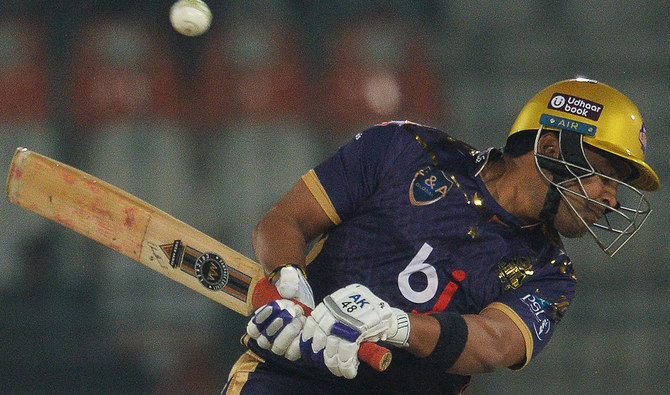KARACHI: Pakistani batter Umar Akmal, under pressure again as his squad falters in the eighth edition of the Pakistan Super League (PSL), is confident he can turn around the fortunes of both himself and his team.
Re-inducted as a player in Quetta Gladiators for the new PSL season, Akmal has only featured in two matches, scoring a total of 15 runs before being dropped for the next two. His team also finds themselves at the bottom of the table with three defeats and one win in four games.
On April 27, 2020, Akmal was banned from all forms of cricket for three years after being found guilty of failing to report numerous match-fixing approaches. That sentence was later reduced to 18 months.
In an exclusive interview with Arab News at the training ground at the National Bank Arena stadium in Karachi this week, Akmal spoke confidently about the crisis of both his team’s performance and his own batting form.
“We have been a bit unlucky in the matches. The team we have, and the big names we have, we should be able to turn it around and we will try our best to improve and win in the future,” he said.
Evaluating the Gladiators’ defeats after the game, he added:
“In the post-match reviews, we learn a lot of things. We have a lot of big-name players, our franchise itself is a big name. We’ve been practicing a lot and have had a lot of discussions with the coaching staff.”
Does Akmal think it would help the franchise’s form if they were able to host matches on home ground in Quetta?
“Look it’s cricket, and we’re playing in Pakistan, whether we play in Quetta, Karachi, Lahore or Rawalpindi, the conditions are mostly the same,” he said. “But obviously playing in front of our home crowd will be a big boost for us, when our crowd supports us, hopefully we will win.”
And what about his personal form?
“No one’s career is decided in two matches,” Akmal said. “That’s all it’s been [so far], I will try and improve things, and I’m practicing and likewise my best wishes are with the rest of my team.”
“Not even half the tournament has passed,” he added.
And there were other things to look out for, he said, such as a number of young players shining through in this year’s edition:
“All the young players performing for every franchise have my best wishes, and I hope they continue to perform well and play for Pakistan.”











